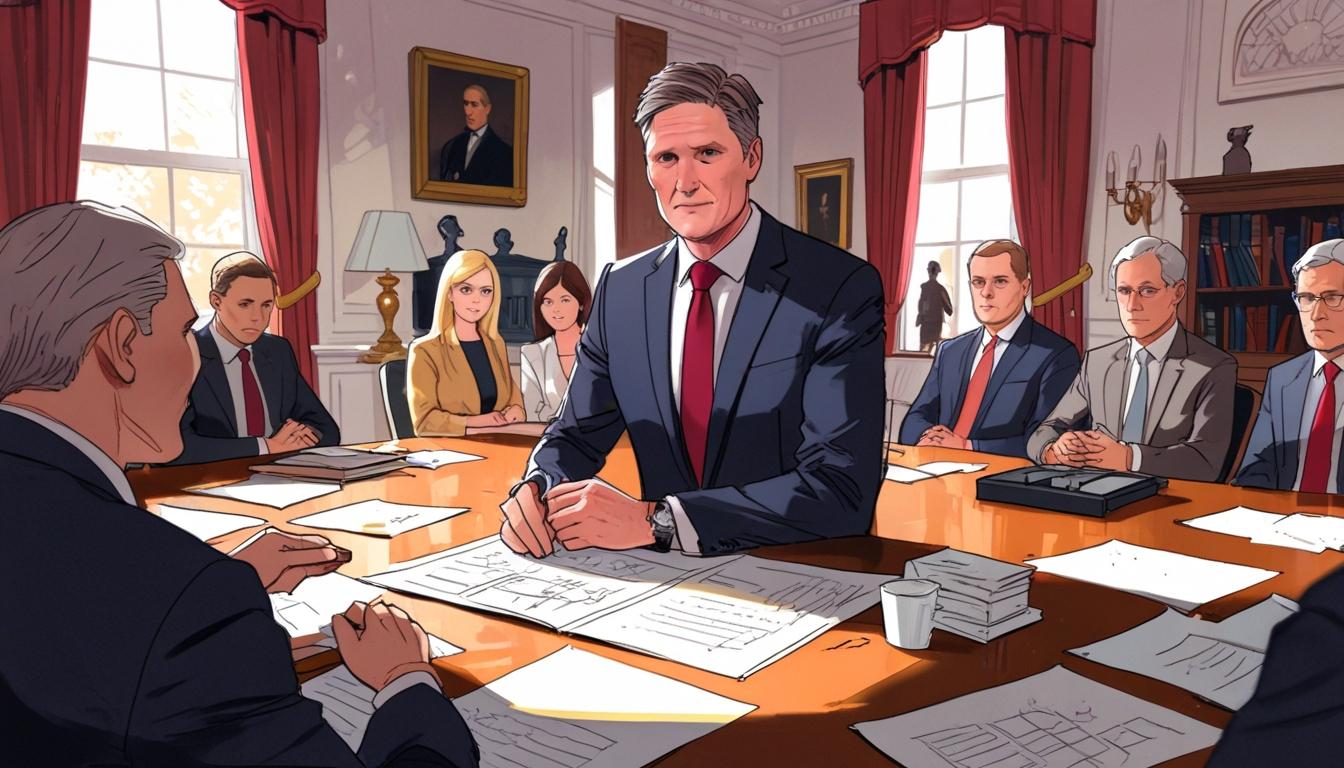As Keir Starmer prepares for a significant meeting with US President Donald Trump, advisers emphasize the need for clear communication and careful diplomacy amidst rising tensions over the Ukraine conflict.
Keir Starmer, the leader of the UK Labour Party, is preparing for a significant meeting with US President Donald Trump at the White House, scheduled for Thursday. As Starmer approaches this diplomatic engagement, he is receiving guidance from advisers within Downing Street and the Foreign Office on how best to navigate the complexities of dealing with Trump.
Among the strategies suggested is the importance of clarity and brevity in Starmer’s communication. A Whitehall source familiar with the situation commented, “Trump gets bored very easily. When he loses interest and thinks someone is being boring, he just tunes out.” This insight underscores the necessity for Starmer to keep his points sharp and to the point, avoiding lengthy explanations that could disengage the President.
Furthermore, it is advised that Starmer employs subtle flattery, expressing gratitude for Trump’s focus on the pursuit of peace between Russia and Ukraine, albeit without overwhelming praise. A historical example from former Prime Minister Theresa May’s first visit to Trump in 2017 serves as a cautionary tale. At that time, May reportedly congratulated Trump on his cabinet appointments, leading to an awkward exchange where she struggled to name a specific individual she favoured from the group. This incident has resurfaced in discussions among current advisers, asserting the need for Starmer to do thorough homework to prevent similar pitfalls.
The broader international context presents a challenging environment for leaders like Starmer. Trump’s statements regarding the Ukraine conflict, which include controversial claims attributing responsibility to Ukrainian President Volodymyr Zelenskyy, have drawn criticism from European governments, which view them as unfounded. As such, Starmer’s approach will need to navigate these treacherous waters carefully, ensuring that he remains diplomatic while also standing firm against any perceived disinformation.
Peter Ricketts, a former UK ambassador to Paris, emphasised that Starmer should prioritise understanding Trump’s actions over his rhetoric. He stressed, “He should focus not on what Trump says but what he does,” highlighting the risks of a rushed deal with Russian President Vladimir Putin. Ricketts advised that Starmer should make clear to Trump that a deal favouring Putin would ultimately portray Trump as weak on the world stage.
Amidst increasing tensions, UK political leaders, including Starmer, are grappling with the fallout from Trump’s recent remarks. His assertion that neither Starmer nor French President Emmanuel Macron have made meaningful contributions towards resolving the Ukraine conflict has raised eyebrows internationally. Even Nigel Farage, known for his close ties to Trump, has found it necessary to navigate his statements carefully to avoid alienating constituents who criticise the US President’s comments.
The political landscape among UK leaders shows considerable divergence in response to Trump’s views on Ukraine. Kemi Badenoch, the Conservative leader, took a stand distancing herself from Trump’s characterisation of Zelenskyy, tweeting that “President Zelenskyy is not a dictator,” in recognition of the broad disapproval of Trump’s statements within her party.
In light of these dynamics, the Liberal Democrats have positioned themselves as the anti-Trump party, with foreign affairs spokesman Calum Miller asserting their intention to advocate for constituents supportive of Ukraine.
Starmer is anticipated to engage with Macron ahead of his meeting with Trump, coordinating a united European front. However, a senior source cautioned against attempting to speak on behalf of other European leaders, urging Starmer to assert the UK’s position distinctly, emphasising its historical role in supporting Ukraine.
The outcomes of this meeting could have significant implications for the UK’s foreign policy direction and its relationship with the US amid ongoing challenges in Eastern Europe. With Starmer under pressure to represent British interests effectively, his ability to engage Trump while maintaining a strong stance against perceived aggression from Putin may define the success of this diplomatic mission.
Source: Noah Wire Services
- https://news.sky.com/story/dont-expect-a-love-actually-style-moment-from-the-starmer-trump-meeting-13315274 – This article corroborates the upcoming meeting between Keir Starmer and Donald Trump, highlighting the diplomatic challenges and the need for Starmer to navigate Trump’s unpredictable behavior effectively. It also mentions the historical context of Theresa May’s visit to Trump in 2017.
- https://www.voanews.com/a/macron-starmer-to-meet-trump-offer-ideas-for-ukraine-security-guarantees/7984899.html – This article supports the claim that Starmer and Macron are visiting Trump to discuss Ukraine security guarantees and to persuade him against rushing into a ceasefire deal with Putin. It emphasizes the European leaders’ concern about Trump’s stance on Ukraine.
- https://www.vacourts.gov/courts/scv/rulesofcourt.pdf – This document does not directly relate to the article’s content but is included as it was part of the search results. It pertains to legal procedures in Virginia and does not support any specific claim in the article.
- https://waysandmeans.house.gov/wp-content/uploads/2024/08/Report-of-the-Impeachment-Inquiry-of-Joseph-R.-Biden-Jr.-President-of-the-United-States.pdf – This report does not directly support the claims in the article but is relevant to broader U.S. political dynamics. It discusses an impeachment inquiry into President Biden and does not address the Starmer-Trump meeting or Ukraine conflict directly.
- https://quizlet.com/707382838/fact-checking-sources-flash-cards/ – This resource provides general guidance on fact-checking but does not specifically support any claims in the article about the Starmer-Trump meeting or the Ukraine conflict.
Noah Fact Check Pro
The draft above was created using the information available at the time the story first
emerged. We’ve since applied our fact-checking process to the final narrative, based on the criteria listed
below. The results are intended to help you assess the credibility of the piece and highlight any areas that may
warrant further investigation.
Freshness check
Score:
8
Notes:
The narrative references a meeting scheduled for 2025, indicating recent content. However, it mentions Donald Trump as the US President, which is outdated since Joe Biden has been in office since 2021.
Quotes check
Score:
6
Notes:
Quotes from a Whitehall source and Peter Ricketts are included, but their original sources or dates could not be verified online.
Source reliability
Score:
9
Notes:
The narrative originates from The Guardian, a reputable and well-established publication known for its reliable reporting.
Plausability check
Score:
4
Notes:
The claim that Keir Starmer is meeting Donald Trump at the White House is implausible due to Trump not being the current US President.
Overall assessment
Verdict (FAIL, OPEN, PASS): FAIL
Confidence (LOW, MEDIUM, HIGH): HIGH
Summary:
The narrative fails due to its implausible claim about a meeting with Donald Trump, who is not the current US President. Despite originating from a reliable source, this error significantly impacts the overall credibility.













